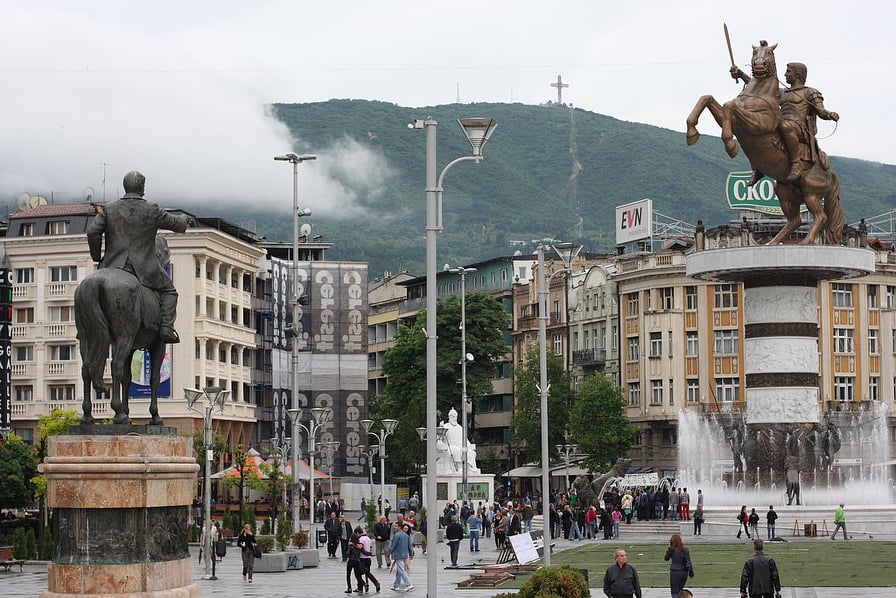For quite some time, members of the Greek society have held a commonplace belief that Macedonians are constantly “stealing” the history of Ancient Macedonia, which is “rightfully Greek,” and that nobody could believe or support the opposite. Unfortunately, to some extent, this has permeated throughout parts of Western society, for example within areas of academia and politics, where philhellenism prevails. This is a sorrowful double standard, which not only accepts but embraces Greek 19th century romantic nationalism, whilst at the same time it marginalises and attempts to deconstruct its Macedonian counterpart.
History teaches us that both the modern Macedonian and the modern Greek nation are relatively modern social constructs as a result of the “Rise of Nationalism” throughout the Ottoman Empire. Moreover, that both nations gradually differentiated themselves from the Rum Patriarchist Christian “millet,” and respectively formed their own nations in the late and early-middle 19th century. It is a clear and well-established fact that since modern nations are not tribes, neither the Greek nor the Macedonian nation can claim to be the direct and only descendants of the Ancient Greeks or the Ancient Macedonians.
As much as modern Greece has the right to base part of its nation’s historiography and patriotism on the glory of Ancient Greece, on genetic and cultural grounds, so too does the modern Macedonian nation attain that same right in regards to Ancient Macedonia. Indeed, as it was the Ancient Macedonian people who gave us their land and name.
How can it thus be possible for a Macedonian not to feel at least a small amount of connection to Ancient Macedonia when K.P. Misirkov was born in Postol, ancient Pella. Or when one personally has roots from Bitola in Lynkos, from Voden-Edessa or Lychnid- modern day Ohrid, or somewhere near Bylazora?
What people believe about the past is a million times more important than the past itself, for this affects the way they perceive the world. It is therefore important to revisit what the Founders of Greece and Macedonia truly believed about the heritage of Ancient Macedonia.
Sources indicate that the Greek nation’s stance on Ancient Macedonia throughout the early stages of its development in the early to mid 1800s was “mixed.” Dozens of prominent Founding Fathers of the Greek nation considered Ancient Macedonians not only non-Greek barbarians, but conquerors of Ancient Greece as well. Professor Saripolos, for example, considered Macedonians the first enslavers of Greece after whom the Roman and the Ottoman yoke followed.[1] Yakovakis Rizos Neroulos, in the same spirit, proclaimed in 1841 that the biggest crime that Philip committed against Greeks – even bigger than defeating them at Chaeronea – was to give birth to Alexander![2]
Greeks finally started accepting Ancient Macedonians as their “ancestors” in the mid to late 1850s, the exact same time, suspiciously, when the Imperialist “Megali Idea (“great idea”) concept had rooted in the Greek society. This is roughly around the same time when Miladinov commented that “they (the Greeks) want Macedonia to become a Greek land but they cannot understand that She cannot be Greek.”[3]
Furthermore, one can find Macedonian activists mentioning ancient Macedonia and considering them as Macedonian’s ancestors throughout the entirety of Macedonia’s ethnogenesis. For example, when they fought against Greek Patriarchist supremacy, Bulgarian and Serbian assimilation, and during the armed National Liberational Struggle of the Internal Macedonian Revolutionary Organisation (VMRO).
The Russian Slavist V.Gligorovich, who visited many places in Macedonia in the 1840s, mentions that “in all places I’ve been I’ve not heard other names except from those of Alexander the Great and Marko Kralievich.”[4]
The Miladinov Brothers on their collection of folk songs (1861), include two folk tales; one about “Czar Alexander” and one about “Voden, the capital of the Macedonian Czars.”[5]
Kuzman Shapkarev would teach Macedonian schoolchildren in the 1870’s that “the place where we live is called Macedonia,” and “in the old times Macedonia was a strong kingdom that, under Alexander the Great conquered the whole known world.”[6]
Prominent Bulgarian national activist P.R Slaveykov, in 1871 opposed that Macedonians reject Bulgarian assimilation by clinging to Ancient Macedonia. “Many times we have heard from Macedonists that they are not Bulgarians but Macedonians, descendants of the Ancient Macedonians.”[7] Around the same time, Stefan Salgadzhiev mentions a Solun teacher who proclaimed that “I am neither Bulgarian nor Greek, nor am I Cinzar. I am a pure Macedonian as were Philip and Alexander of Macedon and the philosopher Aristotle.”[8]
Macedonia’s VMRO војводини (revolutionaries) also embraced the heritage of Ancient Macedonia and considered Her one the same, as the Ottoman Macedonia they were trying to liberate. Nikola Karev, the president of the Krusevo Republic admitted to a Greek reporter who was ironic to him that, yes, he considers himself to be a descendant of Alexander the Great.[9] Jane Sandanski believed that “the inhabitants of Macedonia are only Macedonians, descendants of the ancient Macedonians of Philip and Alexander, who were not Greeks but a special Macedonian nation that fought against the Greeks and defeated them”.[10] Furthermore, George F. Abbott in 1903 also emphasized that “in their proclamations the leaders of the Slavo-Macedonian Committee appeal to Alexander the Great as a national hero.”[11]
Of course, this list is just illustrative and not exhaustive. There remain hundreds, if not thousands, of other examples one could find.
Ultimately, it should considerably be acknowledged that Macedonia’s history and indeed, 19th century Macedonian romantic nationalism, has been widely appropriated by Greece. I would like to emphasize the following point; Greece’s denial in recognizing Macedonia’s ancient past, and its mistreatment of Macedonia as an alien migratory nation that came from “somewhere afar,” hides only one goal. That goal is the delegitimization of Macedonian’s connection to Macedonia, and furthermore, the moral justification for the displacement and exodus of Macedonians in the 1940s. Not to mention the ongoing political aggression deployed by Greece against the Republic of Macedonia, countlessly discriminating and denying its fundamental rights in the 21st century.
In order to win the propaganda war that has been inflicted upon Macedonia, all possible means must be used to advance the Macedonian cause within the West. This is especially considering that the future and security of Macedonia in many ways depends on how favorable the West is towards Macedonia. Unfortunately, in the past 30 years the West has proved not be so favorable.
Whenever the so called “name issue” gained media attention, it was presented as primarily a bilateral difference between the two countries. For instance, a border dispute, where both countries stand on equal grounds with equal rights. Indeed, this issue suddenly emerged when Macedonia appeared out of inexistence in 1991 and claimed a “historically Greek” name. It is evident that this stance is fallacious on many grounds.
We, as Macedonians, need to present ourselves within the international sphere as a nation like the Uyghurs, the Tibetans, the Kurds, the Armenians, the Israelis and the Palestinians. This is considering that these nations, although mostly portrayed as small, are proud people who fight for their existence against those powers who have actively sought to wipe them off the world map. Similarly, Macedonian’s face their own David vs Goliath battle and therefore, although different from the above-mentioned peoples, nonetheless withstand similar experiences and struggles. This makes our causes for human rights and recognition more alike than different.
What is important for the Macedonian youth now, both in the Republic of Macedonia and the Diaspora, is to cultivate a stance towards our ancient past, which is healthy and in accordance with scientific truth. Both claiming direct bloodline from Ancient Macedonians – the extravaganza Greeks are prone to – and ignoring them completely, are wrong. After all, modern Macedonia, what all Macedonians are, was formed in a complex historical process of the amalgamation of the Paleobalkan, Slavic, and Christian culture over the course of hundreds of years.
—
Any opinions or views expressed in articles or other pieces appearing in UMD Voice are those of the author alone and are not necessarily those of the United Macedonian Diaspora and its young leaders’ program Generation M; the appearance of any such opinions or views in UMD Voice is not and should not be considered to be an endorsement by or approval of the same by UMD and Generation M.
[1] Roumen Daskalov and Tchavdar Marinov: Entagled Histories of the Balkans. Volume 1, page 284
[2] Lithoksoou: On the Ancient Macedonians (Λιθοξόου: Περί των Αρχαίων Μακεδόνων) Text in Greek and Macedonian : http://www.lithoksou.net/p/peri-ton-arxaion-makedonon-2008
[3] Ibid.
[4] Виктор Иванович Григорович: Очерк путешествия по Европейской Турции. Page 139
[5] Браќа Миладиновци: Зборник (Блгарски народни песни), Преданија, “Цар Александар” и “Воден” online version: http://macedonia.kroraina.com/bugarash/bnpesni/index.htm
* On why “Zbornik” was officially called “Bulgarian Folk Songs” watch Mario’s History Talks https://www.youtube.com/watch?v=x-Gzk4JJL0w
[6] Кузман Шапкарев: Първоначялньi познанiя за малечкьiте дечиня по наречiе по-вразумително за Македонскьiте Българьi, page 38
[7] Blazhe Koneski; Towards the Macedonian Renaissance. https://vmacedonia.com/language/towards-the-macedonian-renaissance.html
[8] Ibid.
[9] Newspaper Ακρόπολις: 8/5/1903 page 1 https://srv-web1.parliament.gr/display_doc.asp?item=47395&seg=67871&fbclid=IwAR24iyqJB1U-iwE1zo9Jd2j6F3M_9FUYbdLP1j6FP1iLY028la3v3YYs9bs
[10] Ελευθέριος Σταυρίδης: Τα Παρασκήνια του Κ.Κ.Ε , page 213
[11] The tale of a tour in Macedonia, by G. F. Abbott. page 278 online version: https://babel.hathitrust.org/cgi/pt?id=hvd.32044044484319&view=1up&seq=310

